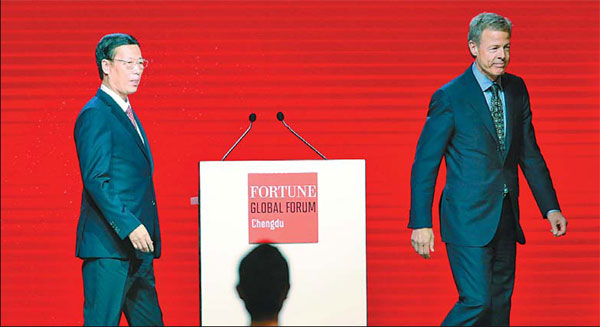Global investors going west
Updated: 2013-06-07 07:32
By Li Jiabao (China Daily)
|
||||||||
|
Vice-Premier Zhang Gaoli, accompanied by Time Warner Inc Chief Executive Jeff Bewkes, walks to the podium to deliver his keynote speech at the opening ceremony of the Fortune Global Forum in Chengdu, Sichuan province, on Thursday. Feng Yongbin / China Daily |
Sichuan's capital now hosts 238 of Fortune Global 500 companies
China's emerging western region has become increasingly attractive to global investors, with money flowing into high-end industries rather than old factories that might have been relocated from coastal areas, the mayor of Chengdu said on Thursday.
"Many multinational companies have been unwilling to see their investment in the western region labeled as industries simply being transferred from coastal areas, which often implies new plants with old facilities and technology," said Ge Honglin, during the Fortune Global Forum, being held in the southwestern city from Thursday to Saturday.
The capital of Sichuan province is now home to 238 of the Fortune Global 500 companies, compared with 130 in 2008, according to Ge.
"Many executives have stressed that they came to the western region for development, and that they have brought probably their most advanced technology or most competitive products to the region," Ge said.
Ellen Kullman, chief executive officer of DuPont, said that the company established a plant in Chengdu last year while jointly setting up a research institution with Sichuan University to develop new fire- and heat-resistant materials. An innovation center is also being planned.
"The western city is now a hub for many manufacturing industries and we are glad to have set up a plant here," she said.
"Many products made in China are being sold on the global market," she added.
"The Chinese market is often used to balance other emerging markets, including India and South Africa. Our research and development team in China has doubled but is still very busy."
DuPont's annual Chinese sales were around $3 billion, between 8 and 9 percent of the company's global sales. It has about 7,000 Chinese employees, within a global workforce of 67,000.
Ge added that the city invites multinational companies into Chengdu, which are not just eyeing local or provincial markets.
"We expect products developed by these companies to go to the global market."
Chengdu is considered the development powerhouse of the western region, receiving the highest amount of non-financial foreign direct investment.
FDI in the western region surged 25.7 percent year-on-year in the first four months of this year to $3.11 billion, compared with a 1.1 percent decline in the eastern region, and a 5.7 percent rise in the central area during the same period, according to the Ministry of Commerce.
Exports from the western region jumped 36.7 percent year-on-year from January to April, compared with a national 17.4 percent export growth in the same period.
"We came to Chengdu as early as 2000, and it is the most successful decision we have made," said Bruno Lafont, executive chairman and chief executive officer of Lafarge SA.
"We appreciate the local government's work in simplifying procedures as well as their supportive policies."
A direct rail route linking the inland Chinese metropolis to the central Polish city of Lodz was opened earlier this year, becoming the fastest rail freight route between China and Europe.
Ge said the new route was also more competitively priced than equivalent sea rates.
"When we invite multinational companies into the city, we focus on their connections with local small- and medium-sized enterprises, how they might boost the development of new technical products, and how they might fit into local industrial and supply chains," Ge added.
lijiabao@chinadaily.com.cn
(China Daily USA 06/07/2013 page19)

 Michelle lays roses at site along Berlin Wall
Michelle lays roses at site along Berlin Wall
 Historic space lecture in Tiangong-1 commences
Historic space lecture in Tiangong-1 commences
 'Sopranos' Star James Gandolfini dead at 51
'Sopranos' Star James Gandolfini dead at 51
 UN: Number of refugees hits 18-year high
UN: Number of refugees hits 18-year high
 Slide: Jet exercises from aircraft carrier
Slide: Jet exercises from aircraft carrier
 Talks establish fishery hotline
Talks establish fishery hotline
 Foreign buyers eye Chinese drones
Foreign buyers eye Chinese drones
 UN chief hails China's peacekeepers
UN chief hails China's peacekeepers
Most Viewed
Editor's Picks

|

|

|

|

|

|
Today's Top News
Shenzhou X astronaut gives lecture today
US told to reassess duties on Chinese paper
Chinese seek greater share of satellite market
Russia rejects Obama's nuke cut proposal
US immigration bill sees Senate breakthrough
Brazilian cities revoke fare hikes
Moody's warns on China's local govt debt
Air quality in major cities drops in May
US Weekly

|

|








